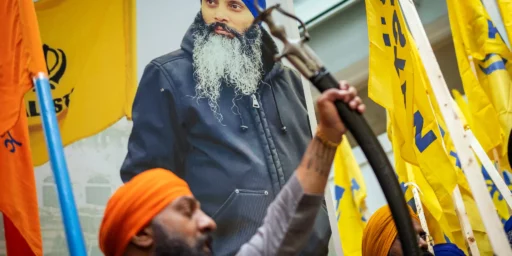Indian Supreme Court Criminalizes Homosexual Acts
Via the Times of India: Supreme Court makes homosexuality a crime again
The Supreme Court on Wednesday dealt a cruel blow to lakhs of homosexuals, many of whom had started living together after the Delhi high court decriminalized same-sex relationships four years ago, by making it a crime again, even if it is consensual and done between adults in private. The ‘crime’ will attract a maximum punishment of life imprisonment.
The bench of Justices Singhvi and S J Mukhopadhaya reversed the Delhi HC’s 2009 verdict and held that the 150-year-old Section 377, criminalizing gay sex, "does not suffer from the vice of unconstitutionality".
[…]
The bench said: "In the light of plain meaning and legislative history of the section, we hold that Section 377 IPC would apply irrespective of age and consent." It added that the section does not discriminate any group with a particular sexual preference, a stand that was diametrically opposite to that by the Delhi HC.
"It is relevant to mention here that Section 377 IPC does not criminalize a particular people or identity or orientation. It merely identifies certain acts, which if committed, would constitute an offence. Such prohibition regulates sexual conduct regardless of gender identity and orientation,"Justices Singhvi said.
The specifics of the law in question:
The court said though the Law Commission of Indian in its 172nd report recommended deletion of Section 377 and that the Centre has chosen not to challenge the Delhi HC verdict, "Parliament, which is undisputedly the representative body of the people of India, has not thought it proper to delete the provision." Parliament has not amended the law either, it added.
Section 377 of the Indian Penal Code, enacted by British 153 years ago in 1860, terms consensual anal sex an "unnatural offence" and provides punishment equivalent to that for the offence of rape under Section 376. It even outlaws oral sex between man and woman, while holding that only penile-vaginal sex was not "against the order of nature".
It says: "Whoever voluntarily has carnal intercourse against the order of nature with any man, woman or animal, shall be punished with imprisonment for life, or with imprisonment of either description for a term which may extend to 10 years, and shall also be liable to fine." It also explains that "penetration is sufficient to constitute the carnal intercourse necessary to the offence described in this section."
Section 377 had been declared discriminatory in a 2009 ruling by the Delhi high court. The ruling this week reverses that lower court position.
The ball is now in the government’s court (via the BBC, India government mulls legalising gay sex):
The Indian government is considering decriminalising homosexuality, a day after the country’s top court upheld a law which criminalised gay sex.
Law Minister Kapil Sibal said "all options were being considered to restore a 2009 Delhi High Court order" which had decriminalised gay sex.
Earlier, Finance Minister P Chidambaram said the ruling had taken India "back to 1860".






This is depressing, not just because of the walk backwards in social progressiveness, but because of the complete abdication of judicial authority by the court. The Indian SC literally said that, no matter how crappy a law is, it’s only for the Legislature to get rid of it – not the courts. Which basically makes the Indian court system, at best, a waste of time. If the court system cannot actually protect people from bad laws, why use it at all?
@legion:
I think its depressing that India has a law against homosexual acts, but I can understand the requirement that a democratically elected government rather than an appointed court be required to change laws. Isn’t the purpose of a court system to determine whether a specific action broke the law or not, rather than to determine what the laws should be? Why bother with elections if the people elected don’t have the right to make laws?
Courts have become extremely politicized. People think the court should have the power to make laws when the decision is one they like, but then think the court is overstepping its bounds when they don’t like the decision.
I guess for me, when it comes down to it, I trust the outcomes of elections more than I trust the outcomes of appointing a handful of people and letting them make laws for as long as they have a pulse. Especially given the weight given to precedence — once one set of appointed judges makes a judgment it tends to be set in stone; great if its a good decision, lousy if its a bad one. Elections give more flexible lawmaking.
I don’t know what its like in India, but in Canada and the US, I would trust the outcome of an election about everything from homosexual sex to abortions more than I’d trust nine judges appointed for life (from what I’ve seen of polls, both would overwhelmingly be allowed by an election).
@george: I understand your argument, but it makes several assumptions… first,
Well, who do you think appoints those courts? The Judge Fairy? No, it’s the same people democratically elected to run the country. The next question is: why?
It should be reasonably safe to assume that the people appointed to judgeships are pretty well-versed in the law, if not active lawyers already. Absolutely _no_ such assumption can be made about legislators – they may have the job of _making_ laws, but they have no experience in doing so prior to their election and frankly, little motivation to get it right. Nobody ever got kicked out of office because a law they passed was declared unconstitutional.
Also,
Considering that, at least in the US, Congressmembers have (IIRC) a better than 85% re-election rate, those people already _are_ making laws for as long as they have a pulse. Secondly, no court “makes” laws. They can interpret them – as they are chartered to do – and they can declare laws unconstitutional, but they can’t just up and _do_ any of those things, no matter how strongly the judges feel about an issue – the case must be brought _to_ them and argued in open court. Your entire argument seems predicated on the idea that the people in the legislature are somehow more skilled and more trustworthy than judges, which is something I would not care to wager on.
Finally, try to imagine living in a country that was actually run as you describe… Where every law – EVERY law – was fair game for re-writing, re-interpretation, or dismissal every single time the balance of power – or even a handful of polls – shifted from one side to another. “Are we married this year or not?” “I don’t know – is our house a church or a business?” “Let’s go out to eat!” “We can’t – the senator who hates fish talked Congress into outlawing sushi last week.”
Thank the FSM for a written Constitution and for John Marshall.
@legion:
The problem is that supreme court judges are appointed for life – having someone with such guaranteed power for so long is typically a bad thing.
And I think ultimately every law is already fair game for re-writing; even the constitution is only as solid as the population behind it. If 60% of the population consistently voted to radically change it, it would be changed. If the population got very upset and decided upon a revolution (flashback to 18th century America or France), then laws would get dramatically re-written.
The things you worry about aren’t safeguarded against by the laws, but by most people not wanting radical change.